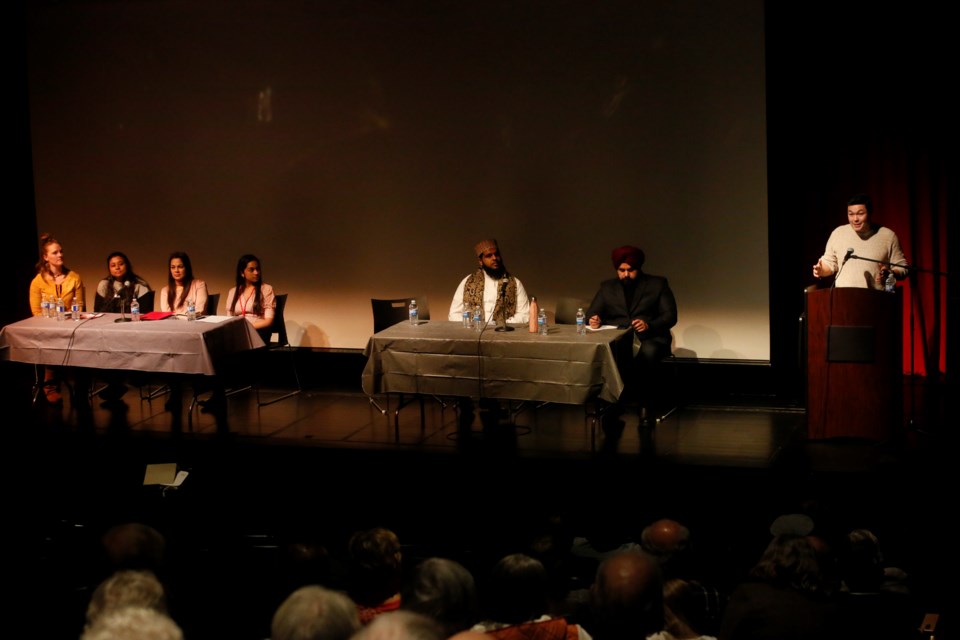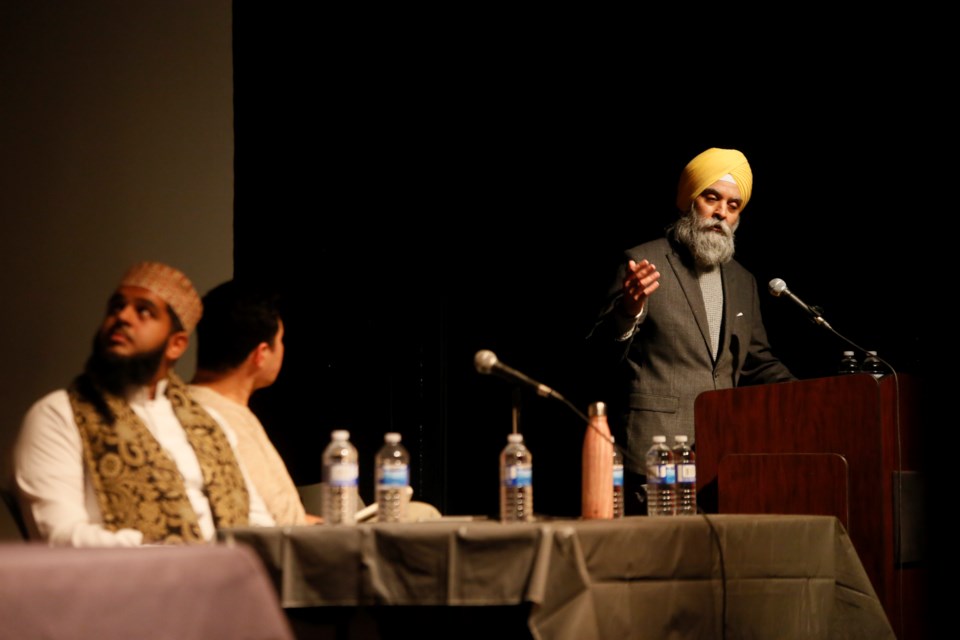The Halton Hills Interfaith Council (HHIC) has risen.
The new group came together to host a discussion Sunday afternoon at the John Elliott Theatre between the Christian, Islamic, Baha’i, Buddhist, Sikh and Hindu faiths for World Religion Day.
Mayor Ann Lawlor, who has been credited with assembling the body last fall, said the decision to shepherd all the faiths under one tent had to do with the town’s increasing diversity.
“Halton Hills has a variety of faith communities that are coming into our town who have not traditionally been here. And in the future, there is going to be even more diversity in spiritual and cultural orientation in Halton Hills,” said Lawlor, who noted that she invited the parties to create a dialogue, but she will not personally be involved going forward.
She added: “I want to build a healthy, interactive, happy community where neighbours get to know one another and like one another. We need a way for those cultures to be able to talk to one another, to be able to share, to be able to have events together.”
The mayor’s ethos of bringing people together manifested in the event’s theme, “Being a Good Neighbour.” The gathering started with local faith leaders and practitioners stepping up to the theatre’s lectern and giving insights about the subject from their lives and faiths.
Alex Meers, representing Buddhists, shined a light on a simple spiritual teaching.
“One of the Buddhist concepts tied to this is called ‘dependent origination.’ It basically is the idea that everything is interdependent,” Meers told the packed audience.
“It's an important concept for us as Buddhists because it means two things practically. One is that part of our happiness is actually tied to the happiness of other people. The second thing is that our life can have a very profound impact on our environment,” Meers said.
Youngster Akshi Bhambani called her faith, Hinduism, a “welcoming philosophy that's open to everyone that goes beyond religious and cultural boundaries.”
One of the many central concepts from her presentation was Vasudhavia Kutumbakam, a Sanskrit phrase that promotes empathy. It does this by recognizing that every person is part of a larger global family.
“This philosophy encourages us to connect on a human level and foster a sense of unity amongst neighbours,” Bhambani explained.
Rev. Kate Young of Georgetown’s St. Andrews United Church represented Christianity and brought out, appropriately, the teachings of Christ.
“Christians, I think we could all agree, follow the teachings of Jesus of Nazareth, who taught us to love our neighbour. To do unto others as we would have done to us. To feed the hungry. To visit the sick and those who are in prison,” Rev. Young said.
Imam Umar Farooq of Ballinafad’s Istiqlal Islamic Centre of Toronto used the metaphor of food not just to encourage neighbourliness, but to also inject some levity into an otherwise serious topic.

“Imagine if your neighbour came to your door and brought you a warm dish of food. Can there be any room after that for you to think negatively about your neighbour?” Imam Farooq said.
“The secret key to the hearts of people, one of the keys at least, is food. Share food because people would like you. That simple. Unless the food is bad,” Farooq joked, drawing laughter from the crowd.
Sikhism’s speaker, Harmandeep Singh - interfaith coordinator of the Ontario Khalsa Darbar - also touched on similar themes.
One of the central tenets of Sikhism is the phrase “ik onkar,” meaning there is one. Singh explained that this is meant to convey there should be no creating division in humanity.
The Golden Temple - the holiest site in Sikhism - has doors facing all four of the cardinal directions to, Singh explained, “signify that everyone from any walk of life is welcome here.”
“Everyone should be welcomed where God is remembered,” Singh told the audience. One integral part of any Sikh house of worship is the langar, a communal kitchen that serves food to anyone for free.
Both Imam Farooq and Singh brought forth examples from their respective religions' founders as examples of neighbourliness.
The youngest of the religions present at the theatre was the Baha’i faith. It was founded in 1844 by Baháʼu'lláh, who was born in 1817.
Practitioners and presenters Shradha Shreshta and Amber Dyck showed everyone several local community building programs that encouraged neighbourliness.
“For me, thinking about being good neighbours means thinking of the spiritual and material development of the next generations and the world that they will inherit,” Dyck said. “Many of our activities focus on the education of children and the education of youth and engaging with entire families in this process of learning together about social transformation and unity.”
The afternoon ended with a question and answer period, where members of the audience sought further insight from the leaders.



